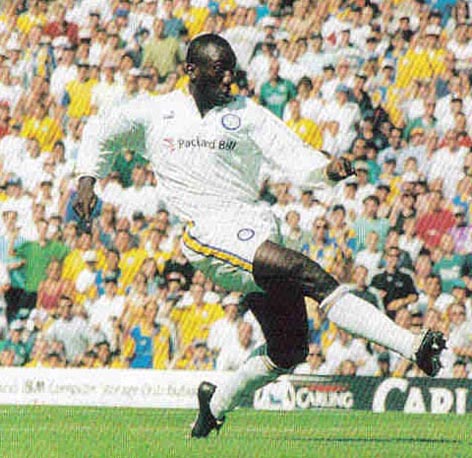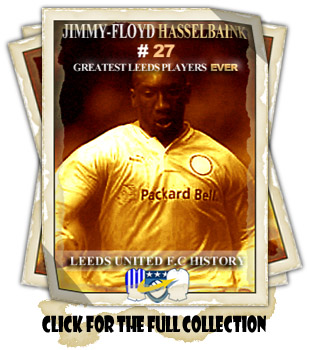

Hasselbaink: Jerrel (Jimmy-Floyd)
1997-1999
(Leeds Player Details)(Player Details)
Centre Forward
Born: Paramaribo, Surinam: 27-03-1972
Debut: v Arsenal (h): 09-08-1997
5’10” 13st 10lb (2007)
#27 in 100 Greatest LUFC Players Ever

Hasselbaink began his football career in the Netherlands, first with SC Telstar, for
whom he played four games in the early 1990-91 season, before he moved to AZ Alkmaar. He
stayed at Alkmaar for three seasons, scoring five goals in forty-sx games, of which many
were from the bench, before being released by the club and ended up playing Non-League
football with Neerlandia on an amateur basis. He signed for Portuguese side Campomaiorense
in August 1995, scoring twelve times in thirty-one appearances, but, after only one season,
Hasselbaink was signed by Boavista where he first came to prominence. He scored twenty
goals in nineteen starts, and ten appearances from the bench, in the League for the club
as well as helping them win the Portuguese Cup and the Portuguese Super Cup in 1997. His
scoring exploits brought him to the attention of George Graham and Leeds United, who signed
him for £2,000,000 on 12th June 1997, beating off oposition from Benfica, Sporting Lisbon,
Werder Bremen and Real Zaragosa to do so. He was an instant hit with the Leeds fans with his
signature “Jimmy” on his shirt as he made a scoring debut against Arsenal at Elland Road on
the opening day of the 1997-98 season. The shirt had to go and he settled for plain
“Hasselbaink”, but the change of shirt did not abate his thirst for goals and, after taking
a while to acclimatise to English Football, he started scoring spectacular goals, followed
by his trademark cart-wheel, with gay abandon. He had a minor falling out with strict
disciplinarian George Graham and missed several games in that time, as well as an enforced
layoff of three games, after being sent off against Bristol City in the League Cup. He
finished his first season with twenty-two goals to his name in all competitions. He was
picked for the Dutch squad for the 1998 World Cup bit did not play a big part but gained in
experience. He made his debut on 27th May 1998 in a 0-0 draw against Cameroon in Arnhem,
quickly followed by scoring in a 5-1 win over Paraguay at Eindhoven on 1st June 1998 and
another goal in another 5-1 win, this time against Nigeria in Amsterdamjust four days later.
Those games were friendlies in the lead up to the World Cup Finals in France and there he
failed to find the net as he was swelected for the 0-0 draw wirh Belgium at St Denison 13th
June 198 and in the 2-2 draw with Mexico in St Etienne on 25th June 1998. They were the
five International Caps he gained while at Elland Road. The following season with the
departure of George Graham, Leeds’ new boss, David O'Leary, started to introduce several
exciting young players into his team and Hasselbaink responded with his best season yet,
scoring twenty goals in forty-seven appearances in all games, and his eighteen League goals
made him the joint top scorer in the EPL, as he became a more consistent and influential
player. It came as a great surprise to everyone when he packed his bags and joined Athletico
Madrid. Great things had been expected from Hasselbaink and the exciting new Leeds team but,
with the new season about to start, he slapped in a transfer request and stated that he
would leave unless he was paid £60,000 per week. This would have made him easily the
best-paid player in the country but it was hopelessly out of the range of what Leeds could
hope to, or want to, pay. Atletico Madrid quickly paid £12 million his services and so he
departed from Leeds without the chance to be farewelled by his adoring fans. He carried on
his scoring but the team was not doing well and, despite Jimmy scoring twenty-four goals in
thirty-four League appearances, they were relegated. His goal-scoring potency and the club's
reliance on those goals was even more apparent as he scored twice in two games in the Cup
and six times in five appearances in the UEFA Cup, so that he had netted thirty-two times
in forty-one games, a return that would have impressed any would be employer as they were
scored in the fiesty atmosphere of La Liga, one of the hardest Leagues in the World. So,
with his reputation enhanced and the Abramovich-backed Chelsea able to meet his wage demands
of nearly £60,000 a week over the term of his contract, a fee of £15 million ensured he was
soon at Stamford Bridge. He continued to deliver with some great goals and strong play on
and off the ball. Sometimes temperamental, but always a player who can create his own goals
and make things happen around him, Hasselbaink scored twenty-three goals in thirty-five
League appearances in the 2000-01 season, including a volley from outside the penalty area
against Manchester United and a four-goal haul against Coventry City. He finished the season
as the EPL’s top goal scorer. He formed a prolific partnership with Icelandic striker Eider
Gudjohnsen in his second year with Chelsea, scoring twenty-nine goals in all competitions
and helping Gudjohnsen to twenty-three in a season which also saw Chelsea reach the FA Cup
Final. Hasselbaink was injured in the game prior to the final and, clearly unfit, he was
substituted early on as Chelsea lost 2-0. In his last two seasons with Chelsea the goals
dried up. He scored only eleven goals in twenty-seven games in 2002-03, though in the next
season he scored seventeen goals in all competitions which, despite the arrival of new
strikers Adrian Mutu and Hernan Crespo, made him top scorer at the club for the third time
in four years. He ended his Chelsea career with eighty-eight goals in one hundred and
fifty-six starts and twenty-one substitute appearances in all games, seventy coming in
just one hundred and nineteen League starts and seventeen substitute appearances. Out of
Contract with Chelsea at the end of the 2003-04 season, Hasselbaink was a free agent and
when Middlesbrough offered him £40,000 per week he moved to the Riverside Stadium. In his
first season he scored thirteen goals in thirty-six League games. He struck the winner in
1-0 wins at Zurich Grasshoppers in the UEFA Cup and against Everton in the Carling Cup. He
was the captain of the Boro side that scored a 4-1 win over Manchester United and scored
the second goal. In his final season with the club, he helped them reach the UEFA Cup Final,
where they lost 4-0 to Sevilla FC. With a change of Manager at Middlesbrough, Hasselbaink
found himself surplus to requirements and was given a free transfer. Negotiations with
Celtic failed due to his wage demands, but he left Middlesbrough as a hero with his fine
goals and leadership which contributed massively to Middlesbrough's success domestically
and in Europe in the two years he was at the club and he signed for Charlton Athletic on
11th July 2006. He had scored thirty-four goals in seventy-five starts and fourteen
substitute games, being twenty-three goals from forty-eight starts and ten substitute
appearances in the League, three in seven starts and one game from the bench in the F.A.
Cup, one goal in three starts in the League Cup and seven goals in seventeen starts and
three games from the bench in European games. On 31st July 2006 Hasselbaink was charged by
the FA with improper conduct and/or bringing the game into disrepute for his claims about
Chelsea. The player alleged his former club paid players a bonus after the 2004 Champions
League win over Arsenal. A Premier League inquiry into what would have been illegal bonus
payments found no evidence to support the claims, which were denied by Chelsea. He scored
his first goal for Charlton against his old team Chelsea at Stamford Bridge on 9th
September 2006, but he didn't celebrate out of respect for the fans. Chelsea's fans in
turn gave him a round of applause, even though his goal had brought Charlton level.
Hasselbaink was also instrumental in advising Scott Carson that Frank Lampard's penalty
would be struck down the middle of the goal, true to form this event transpired and Carson
went on to save the penalty and keep Charlton in the game despite their subsequent loss.
After a long goal drought, Hasselbaink scored against yet another of his former clubs,
Middlesbrough on 13th January 2007, a game which Middlesbrough went on to win. Hasselbaink
was released by Charlton at the end of the season on 14th May 2007. He had scored just
four goals in fourteen starts and fifteen substitute appearances at the Valley and his
contribution of just two goals in eleven starts and fourteen games from the bench had
seen his team relegated. After negotiations with Leicester City had failed, he signed for
Cardiff City on 16th August 2007, where, while playing regularly, the goals dwindled to a
mere trickle. He was signed by former Leeds Chairman, Peter “money-no-object” Ridsdale,
on a one year contract, and teamed up with another expensive ex-Leeds player Robbie
Fowler. He scored seven goals from thirty-three League starts and three games from the
bench and another two goals from seven starts and one game as a substitute in the Cup
competitions. He retired from professional football after failing to secure a new
contract having been released by Cardiff at the end of the 2007-08 season. While at
Cardiff he did help them reach the Final of the F.A. Cup, but they were defeated 1-0 by
Portsmouth and so his only Cup winners' medal was that gained while with Boavista. At
International level with Holland, Hasselbaink had made his debut for the Dutch national
side at a late age. His time as an international suffered due to fierce competition for
the strikers' role, with the presence of Denis Bergkamp, Patrick Kluivert, Ruud Van
Nistelrooy, Pierre Van Hooijdink and Roy Makaay, greatly limiting his opportunities. In
2004 Hasselbaink decided to quit the Dutch national team and no longer made himself
available. He made a total of twenty-three appearances for Holland, eleven starts and
twelve substitutions, and scored nine times. In October 2009, Hasselbaink trained with
Conference South side Woking to help keep himself fit and do some coaching, then he
worked with the Chelsea Under-Sixteens and he studied for his UEFA coaching licences.
In July 2011 he joined the coaching staff at Nottingham Forest and continued to work
towards the UEFA licences. He rejoined Steve McLaren, who had been his Manager at
Middlesbrough, and was then appointed first team coach. He remained as first team coach
after Steve Cotterill replaced Steve McLaren, who resigned in early October 2011.